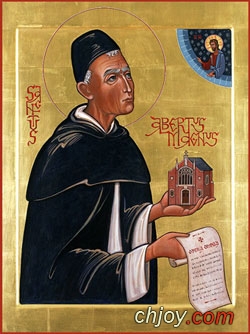
 |
 |
 |
 |
|
رقم المشاركة : ( 1 )
|
|||||||||||
|
|||||||||||
|
تذكار القديس ألبرتوس الكبير  هو من مشاهير الفلاسفة واللاهوتيين والعلماء في القرون الوسطى. ولد سنة 1193 في مدينة لونيجان من أسرة شريفة وتخرَّج بالعلوم في باريس وفي بادوا إحدى مدن إيطاليا. رغب في خدمة الله، فدخل رهبانية القديس عبد الأحد تاركاً الدروس الفلسفية والرياضية والطبيعية، لينصرف إلى درس اللاهوت في مدينة بولونيا ، فأتقنه ونبغ فيه. ودرّس الفلسفة في واستراسبورج وفريبورغ، ولا سيما في بولونيا حيث عظمت شهرته بالعلوم وسعة المدراك حتى لقّب "بالكبير". وتخرَّج عليه تلاميذ عديدون أخصهم القديس توما اللاهوتي والقديس بون افنتورا. ولقد اغنى الكنيسة بمؤلفاته النفيسة ونفخ روحاً جديدة في الدروس المدرسية الفلسفية . وفي الخامس عشر من تشرين الثاني سنة 1280، نقله الله اليه لينيله ثوابه في الأخدار العلوية. وقد اعلنه البابا بيوس الحادي عشر "معلمَ الكنيسة الجامعة"، والبابا بيوس الثاني عشر أقامه شفيع الدارسين. صلاته معنا. آمين. St. Albert the Great The saint and doctor of the Church who would be known as Albertus Magnus was born sometime before the year 1200. He was probably born in Bavaria, a fact we infer because he referred to himself as "Albert of Lauingen," a town which still stands today in southern Germany. We do not know for sure all the details of his family origins, but we know he was well educated. He attended the University of Padua where he learned about Aristotle and his writings. This instruction in philosophy would become the foundation of his later work. Sometime around the year 1223 or so, Albert experienced an encounter with the Blessed Virgin Mary. This encounter moved him so much that he chose to become a member of the Dominican Order. He thereafter studied theology. He excelled in his studies and later became a lecturer for the Dominicans at Cologne. He also traveled around the region to lecture gaining regional, then international acclaim. At the same time he started lecturing, Albert produced "Summa de Bono," after collaboration with Phillip the Chancellor, who was a renown theologian from France. In 1245, Albert became a master of theology under Gueruc of Saint-Quentin. He was the first German Dominican to achieve the title. He later went on to teach theology at the University of Paris, and became the Chair of Theology at the College of St. James. One of his students was the famous Thomas Aquinas who would also become a doctor of the Church and a saint. Albert was very interested in Aristotle, and he made commentary on nearly all of Aristotle's works. He also studied the teachings of several Muslim scholars. At this time, the Islamic world led Europe in terms of scholarship, science, and medicine. In 1254, Albert became the provincial of the Dominican Order. By all accounts, he was a capable and efficient administrator. Five years later, in 1259, Albert participated in the General Chapter of the Dominicans along with Thomas Aquinas and several other contemporary leaders of the Order. They created a program of study for the Dominican order and developed a curriculum for philosophy. From this course of study would later arise the Pontifical University of Saint Thomas Aquinas, in Rome. Today, the university which is known as the "Angelicum," is one of the foremost theological colleges in the world. It is still run by the Dominican order. In 1260, impressed with his acumen, Pope Alexander IV appointed Albert as bishop of Regensburg. Although he was a bishop, Albert refused to ride a horse and went everywhere on foot. This seemingly unusual practice was consistent with the rules of his order. The life of a bishop did not agree with Albert and he resigned from his post in 1263. In that same year, Pope Urban IV accepted his resignation and reassigned him to preach about the Eighth Crusade to German-speaking people. The crusade was intended to recapture the city of Tunis in North Africa for Christendom, and was a total failure. In his later years, Albert became renowned as a mediator. He mediated disputes between individuals as well as resolving a dispute between the people of Colonge and their bishop. He also founded Germany's oldest university in that city. Before his death, he mourned the early passing of his great student, Thomas Aquinas, who would later be recognized as a saint and doctor of the Church. Aquinas died in 1274. Albert spent his last years defending the work of Aquinas which is among the most important work in the Church. Albert became ill in 1278 and he died on November 15, 1280. During his life, Albert wrote thirty eight volumes covering topics ranging from philosophy to geography, astronomy, law, friendship and love. Three years after his death, his grave was opened and his body found to be incorrupt. When his grave was again opened centuries later in 1483, they only found his skeleton. His relics are presently found in the St. Andreas church in Colonge. Albert was beatified in 1622 by Pope Gregory XV. He was canonized and recognized as a doctor of the Church in 1931, by Pope Pius IX. He is the patron saint of scientists. |
|